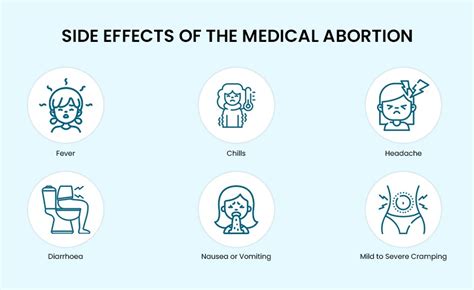Abortion Side Effects

The topic of abortion is complex and multifaceted, encompassing not only medical procedures but also ethical, legal, and emotional considerations. When discussing abortion side effects, it’s essential to approach the subject with sensitivity and a comprehensive understanding of the physical, emotional, and psychological impacts on individuals. Abortion, like any medical procedure, can have side effects, which vary depending on the method used (medical abortion or surgical abortion), the individual’s health, and the gestational age of the pregnancy.
Physical Side Effects
Physical side effects of abortion can range from mild to severe and may include:
- Bleeding and Spotting: This is one of the most common side effects, which can last for several weeks after the procedure. The bleeding is usually heavier than a normal period and can include clots.
- Cramping: Uterine cramps are common, similar to menstrual cramps, and can be managed with pain medication.
- Nausea and Vomiting: Some individuals may experience nausea or vomiting after the procedure, which can be due to the procedure itself or the medications used.
- Fever: A low-grade fever can occur but should be monitored, as a high fever can indicate infection.
- Diarrhea or Constipation: Changes in bowel movements can happen due to hormonal changes or the procedure.
Emotional and Psychological Side Effects
The emotional and psychological impacts of abortion can be significant for some individuals. These can include:
- Relief: Many people feel a sense of relief after having made and acted on a decision that they felt was right for them.
- Grief or Sadness: It’s common to feel sad or grieve the loss of a pregnancy, even if the pregnancy was not desired.
- Anxiety or Depression: Some individuals may experience anxiety or depression, which can be related to the procedure itself, societal stigma, or personal beliefs and values.
- Regret or Guilt: Feelings of regret or guilt can occur, though research suggests that the majority of individuals do not regret their decision.
- Trauma: For some, the experience of abortion can be traumatic, especially if there were complications or if the individual felt coerced or unsupported in their decision.
Long-Term Effects
Research on the long-term physical and emotional effects of abortion is extensive, and the consensus among major medical organizations, including the American College of Obstetricians and Gynecologists (ACOG) and the World Health Organization (WHO), is that abortion does not cause long-term psychological trauma or physical harm when performed safely and legally. However, individual experiences can vary, and support systems are crucial for those who undergo the procedure.
Minimizing Risks and Side Effects
To minimize risks and side effects, it’s crucial to:
- Choose a Safe and Legal Provider: Ensuring that the abortion is performed by a trained provider in a safe environment significantly reduces the risk of complications.
- Follow Post-Procedure Instructions: Adhering to the advice given by healthcare providers regarding rest, medication, and follow-up care can help mitigate side effects.
- Seek Support: Emotional support from friends, family, or professional counselors can help individuals cope with the emotional and psychological aspects of abortion.
Conclusion
Abortion side effects are a critical aspect of the discussion around reproductive health and rights. Understanding these effects, both physical and emotional, is essential for providing compassionate and informed care to individuals considering or undergoing an abortion. Promoting safe, legal, and supportive environments for abortion care is vital for minimizing risks and ensuring the well-being of those involved.
What are the most common physical side effects of abortion?
+The most common physical side effects include bleeding and spotting, cramping, nausea, vomiting, and fever. These side effects can vary in intensity and duration but are generally manageable with rest, medication, and proper care.
Can abortion cause long-term emotional or psychological harm?
+Major medical and psychological organizations conclude that abortion does not cause long-term psychological trauma for most individuals. However, individual experiences can vary, and support is crucial for those who may experience grief, guilt, or other emotions post-abortion.
How can I minimize the risks and side effects of abortion?
+To minimize risks and side effects, choose a safe and legal provider, follow all post-procedure instructions carefully, and seek support from healthcare providers, counselors, or support groups as needed.



